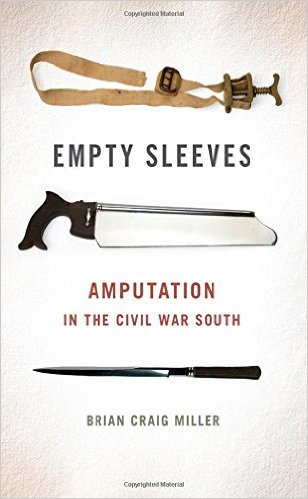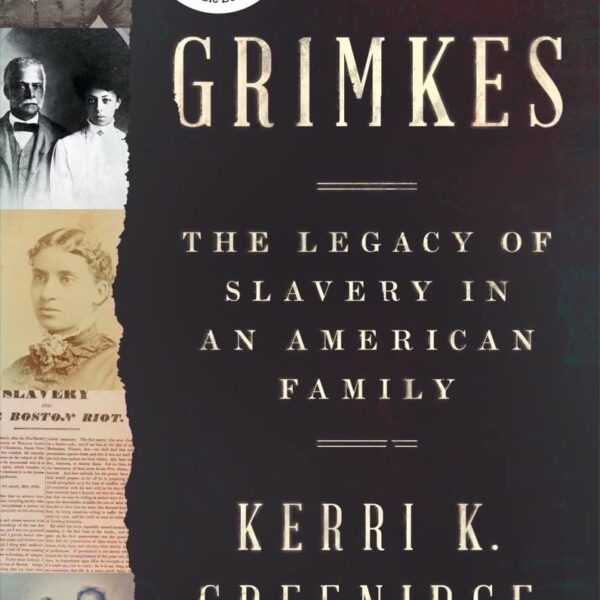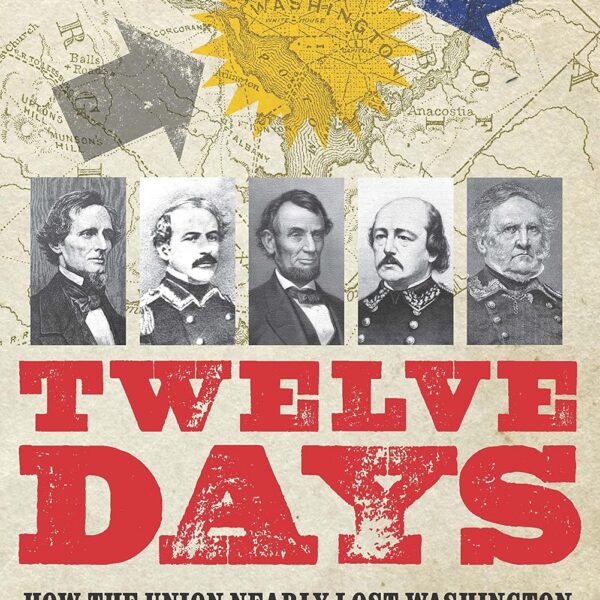Empty Sleeves: Amputation in the Civil War South by Brian Craig Miller. University of Georgia Press, 2015. Paper, ISBN: 978-0820343327. $29.95.
 In the opening pages of Empty Sleeves: Amputation in the Civil War South, Brian Craig Miller reminds the reader of an iconic scene in Gone with the Wind [1939]. Scarlett O’Hara, trying to play the dutiful Southern woman, is working as a nurse in a hospital in Atlanta. But when the time comes to assist in an amputation, O’Hara reaches her limit. She leaves the hospital, explaining: “I’m going home. I’ve done enough” (2). Yet, as Miller’s beautifully crafted book demonstrates, the work of all those involved with amputation—the doctors, nurses, soldiers, families, and even the state—did not end when the stitches were set and bandages applied.
In the opening pages of Empty Sleeves: Amputation in the Civil War South, Brian Craig Miller reminds the reader of an iconic scene in Gone with the Wind [1939]. Scarlett O’Hara, trying to play the dutiful Southern woman, is working as a nurse in a hospital in Atlanta. But when the time comes to assist in an amputation, O’Hara reaches her limit. She leaves the hospital, explaining: “I’m going home. I’ve done enough” (2). Yet, as Miller’s beautifully crafted book demonstrates, the work of all those involved with amputation—the doctors, nurses, soldiers, families, and even the state—did not end when the stitches were set and bandages applied.
Civil War studies is a field just beginning to grapple with disability history, making Miller’s book a vital new addition. Empty Sleeves is the first book-length contemplation of amputation and amputees in Civil War scholarship—a fact which, given its sheer scale and ubiquity in popular memory, Miller rightly notes is surprising. In five chapters, the author considers amputation for different groups: surgeons, patients, women, veterans, and state governments. While the book focuses exclusively on amputation, Miller notes that this must serve as the beginning of a larger conversation about the multiplicity of disabilities and traumas of this war.
According to Empty Sleeves, the dependency wrought by amputation was particularly troublesome in the South. In some respects, the difference seems less distinct than in others—for instance, Miller’s chapters on surgeons and patients, while very good, bear strong parallels to the experience of their Union counterparts, and some of the men and women he describes experienced issues that transcended region. Yet, his case remains powerful in no small part because of his focus on gender. Southern beliefs about masculinity were unique, hinging on men’s mastery over dependents and their ability to confirm that mastery through their physical prowess. “Men,” he argues, “were to embody their own patriarchal power; they were to be robust and strong, and to set their claims to honor before their peers, in acts and rituals as diverse as dueling, drinking, and electioneering” (5). The strength and power of the white male body was a necessary counterpoint to the fragile white female body, but also to the inferior bodies of the enslaved, who were believed to be almost inherently disabled. Thus, as the war reaped a veritable harvest of limbs, Southerners struggled to come to terms with white male disability. The men who were once “masters of small worlds” were now dependents—a direct violation of previous attitudes regarding Southern masculinity. This led to an eventual acceptance of white male dependency and an agreement, however grudging, that such men required support.
This careful exploration of the entanglement of amputation and gender in the Civil War South is one of the greatest contributions of Empty Sleeves. Just as we have come to understand that the Civil War created a “crisis” in gender, so too did amputation. Miller and his subjects repeatedly invoke an image that was well-known in the antebellum South: white men as a sturdy oak, with white women as the delicate vine encircling it. The necessities of wartime altered that relationship. Suddenly, the image changed from delicate vine and solid oak to “tender vine binding up the shattered tree and hiding its wounds” (103). Many Southern women accepted their new roles caring for their wounded soldier; others did not, with John Bell Hood’s fiancé Sally Buchannan Preston as only one example.
Confederate amputees also posed a challenge to the Southern citizenry and state governments. The idea of the former rulers of the Old South asking for handouts posed a challenge to the principles of state governments. Could states offer support to the very citizens who should be the most independent? Charitable organizations tried to help—the Association for the Relief of Maimed Soldiers (ARMS) raised over $100,000 to provide prosthetic legs, while the United Daughters of the Confederacy and the United Confederate Veterans worked to create support networks for disabled veterans. But the scope of care required was more than private groups could provide, meaning that the Confederacy—and later, the former Confederate states—needed to step in. Echoing the historian Stephanie McCurry, Miller argues that Southern state governments stepped in to act as a kind of “ersatz patriarch” when veterans struggled to fulfill the role of provider (145). While some states provided prosthetics during Reconstruction, monetary pensions were not available until after “redemption,” when supporting the aging heroes of the Lost Cause became an ideological part of the establishment of a New South. The pensions created by former Confederate states had much in common with federal laws—the need for veterans to prove their honor but also their dire straits, for instance—but other aspects were distinctly Southern. Border states that had supplied the Confederacy with significant numbers of soldiers, for example, struggled mightily over whether it was appropriate, or even legal, to provide pensions to Confederate veterans. Kentucky’s struggle over whether to support its aging Confederate veterans made it all of the way to the State Court of Appeals, which eventually ruled in 1913 that both Union and Confederate veterans deserved access to pensions because Kentucky had been a neutral state. In the end, efforts to support disabled Confederate veterans appeared, but generally so late (some not until the turn of the century or later) that their impact was limited.
Some passages of this book are so deftly written—the author’s contemplation on the death of Stonewall Jackson as an “amputation” of Robert E. Lee’s right arm is a particularly striking example—that they remind the reader of the importance of good writing to good scholarship. Brian Craig Miller has crafted a beautifully written and extensively researched book on a topic we must give greater attention: the bodily ramifications of the Civil War. Empty Sleeves is a powerful addition to a growing field of work.
Sarah Handley-Cousins, a Ph.D. candidate at the University at Buffalo, is working on a dissertation titled, “‘A Physical Wreck of His Former Self:’ Gender and Disability in the Post-Civil War North.”




